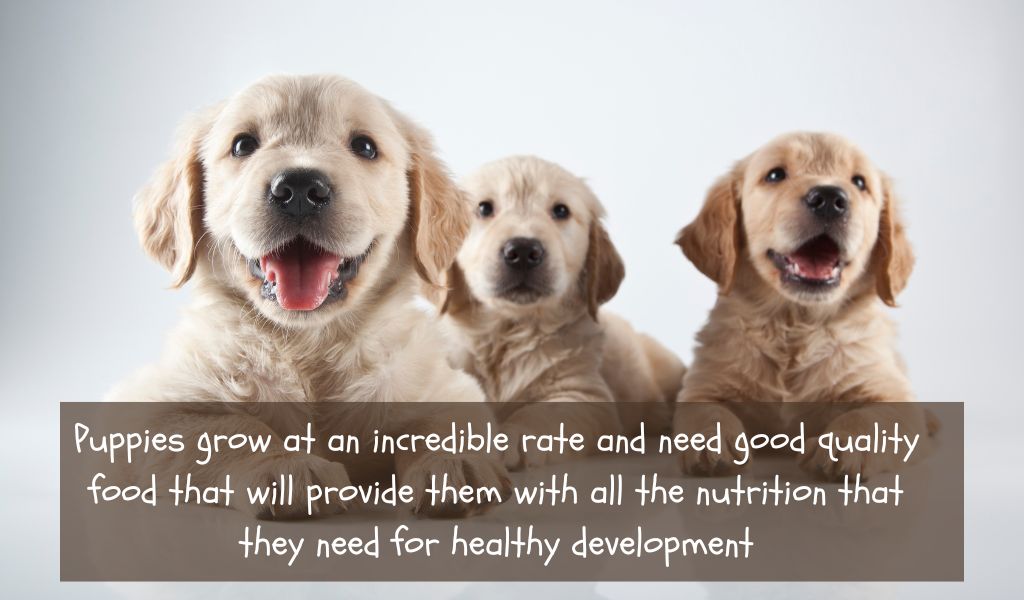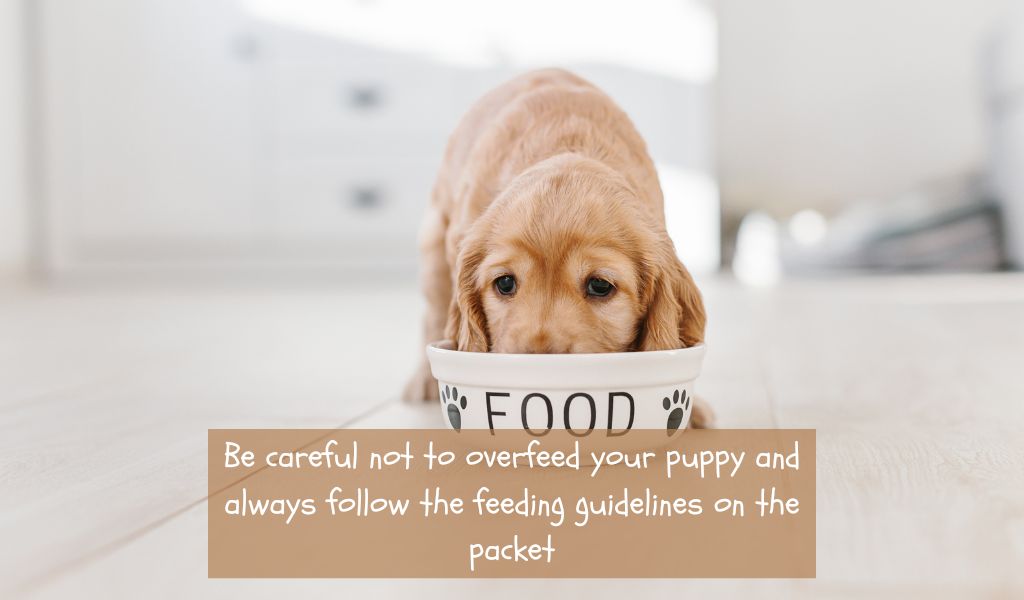Bringing a new puppy into your life is a thrilling and exciting experience, but it also brings new responsibilities, including choosing the right diet to ensure your pup grows up healthy and strong.
With so many options available in the market, it can be challenging to determine what is the best food for your puppy.
In this guide, we dive into the world of puppy nutrition, exploring the healthiest foods for your furry friend, the best diets for a new puppy, and advice on the most recommended kibble.
Whether you prefer wet or dry food, we have got you covered and will answer questions such as is it okay to feed puppy wet food every day, and can you mix wet and dry food for your pup
Puppies need good quality food, that contains meat based protein, and which provides them with a nutritionally balanced diet to meet their demanding growth requirements.
What is the best food for puppies?
The best food for puppies will vary depending on their individual nutritional needs, age, and activity level.
Generally, a balanced diet for puppies should consist of high-quality protein, essential fatty acids, vitamins, and minerals.
Puppies also have specific requirements for certain nutrients, such as calcium and phosphorus, to support their rapid growth and development.
To ensure your puppy gets the right nutrients, it’s recommended to feed them a commercial puppy food that meets the food standards in your country.
You can also consult with your veterinarian to find the best food option for your puppy’s specific needs.

Why do puppies need healthy food?
Puppies need healthy food to support their growth and development.
During the first year of life, puppies go through a rapid growth phase, which puts a high demand on their bodies for essential nutrients.
A balanced and nutritious diet is essential to provide the energy, vitamins, minerals, and amino acids that puppies need to grow into healthy adult dogs.
Eating a healthy diet can help prevent nutrient deficiencies and support a strong immune system, good vision, healthy skin and coat, and strong bones and teeth.
Additionally, a healthy diet can also support the overall health and well-being of your puppy, helping to prevent long-term health problems such as obesity, digestive issues, and other health conditions.
What is the best diet for a new puppy?
The best diet for a new puppy is a balanced and nutritious diet that meets their unique nutritional requirements.
During the first year of life, puppies require more energy, protein, fat, calcium, and phosphorus per pound of body weight than adult dogs.
A high-quality commercial puppy food, either dry or wet, is typically a good choice for a new puppy.
However, it’s important to choose a food that’s appropriate for your puppy’s breed size and specific nutritional needs, which your veterinarian can help you determine.
You should also avoid overfeeding your puppy and regularly monitor their weight to ensure they’re growing at a healthy rate.
Finally, it’s important to provide fresh water at all times, especially when feeding dry food.
What is the best dry puppy food in the UK?
The best dry puppy food in the UK will vary depending on the individual needs of your puppy, such as their breed size, age, and activity level.
However, some highly rated dry puppy foods in the UK include:
Royal Canin Puppy Dry Dog Food
James Wellbeloved Puppy Dry Food
Arden Grange Puppy/Junior Dry Dog Food
It’s important to note that what may be the best food for one puppy may not be the best for another, and it’s best to consult with your veterinarian to determine the best option for your puppy’s specific needs.
They can also help you choose a food that meets the appropriate standards for puppy nutrition and that provides the right balance of essential nutrients for your puppy’s growth and development.

What kibble do vets recommend?
Vets may recommend different kibble brands depending on the individual needs of the puppy and the preferences of the owner.
However, some of the most commonly recommended kibble brands by veterinarians include:
Royal Canin
Hill’s Science Diet
Purina Pro Plan
Iams
Eukanuba






When choosing a kibble, it’s important to consider the puppy’s breed size, age, and specific nutritional needs.
Your vet can provide personalized recommendations and help you find the best kibble for your puppy’s unique needs.
Additionally, it’s important to read the ingredient list and avoid kibble with artificial preservatives, colours, and flavours, and to make sure the kibble provides the right balance of essential nutrients for your puppy’s growth and development.
Is wet or dry food better for puppies?
Both wet and dry food can be appropriate options for feeding puppies, but there is no one-size-fits-all answer to this question.
The best choice will depend on the individual needs and preferences of your puppy and your own personal preferences as a pet owner.
Wet food can be a good option for puppies who are picky eaters or who need to gain weight.
It is also a good source of moisture, which can be especially important for puppies who don’t drink enough water on their own.
On the other hand, dry food can be a good option for puppies who need to lose weight or who have digestive issues, as it is typically lower in fat and easier to digest.
Dry food is also convenient for pet owners as it has a longer shelf life, can be stored easily, and doesn’t require refrigeration.
Dry food can also be a good choice for puppies who are prone to dental problems, as the chewing required to eat it can help remove plaque and tartar buildup.
Ultimately, the choice between wet and dry food will depend on your puppy’s individual needs and preferences, and it may be helpful to rotate between both types of food or to offer a mix of both. It’s best to consult with your veterinarian to determine the best choice for your puppy.
Is it okay to feed a puppy wet food everyday?
Wet foods can be an ideal choice for puppies who need more moisture or are picky eaters, but pet owners must bear in mind they have a shorter shelf life and should always be stored correctly once opened.
Moreover, since many wet foods contain higher levels of fat than dry food it’s important to stick with portion sizes recommended by your vet – too much could create weight problems and related health issues.

Can I feed my puppy a mix of wet and dry food?
Yes, feeding a puppy a mix of wet and dry food can be an appropriate option as long as it meets their nutritional needs and is balanced with appropriate portions.
This can help provide variety in their diet and can also help with picky eating or weight management.
For example, you can offer wet food as a meal option and dry food as a snack or vice versa. You can also mix wet and dry food together in the same meal.
It’s important to note that the nutrient content of wet and dry food can vary, so it’s important to choose a brand that provides the right balance of essential nutrients for your puppy’s growth and development.
Additionally, it’s important to make sure that the portions of wet and dry food are appropriate to ensure your puppy doesn’t overeat and gain weight.
It’s always best to consult with your veterinarian to determine the best choice for your puppy’s specific needs and to ensure they are getting a balanced and nutritious diet.
Final Words
In conclusion, feeding your puppy a healthy diet is crucial for their growth and development.
Both wet and dry food can be appropriate options, but the best choice will depend on your puppy’s individual needs and preferences.
It’s important to choose a brand that meets food quality standards for puppy nutrition and provides the right balance of essential nutrients.
Mixing wet and dry food can also be an option,and will provide your pet with variety, but it’s important to make sure that the portions are appropriate to avoid overeating.
As always, it’s best to consult with your vet to determine the best diet for your puppy and to ensure they are getting a balanced and nutritious diet.
By taking the time to choose the right food for your puppy, you’ll be setting them on the path to a healthy and happy life.







